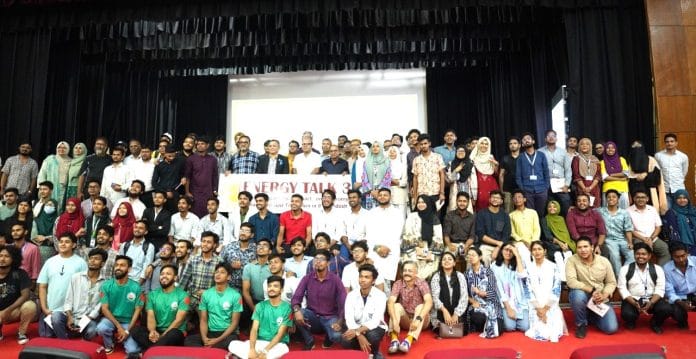In light of Bangladesh’s growing energy demands and environmental concerns, experts, youth leaders, and civil society representatives gathered in Chattogram today to call for a rapid and inclusive transition to renewable energy.
The interactive session, titled “Energy Expansion: Impacts on Bangladesh’s Economy, Environment, and the Path to a Just Transition,” was held at the Premier University auditorium.
The event was jointly organized by Dhritri Rokkhay Amra (DHARA), Premier University, 350.org, and Waterkeepers Bangladesh, with support from several youth and environmental organizations. It aimed to amplify youth voices and encourage critical dialogue on Bangladesh’s energy future.
Bangladesh’s Energy Strategy Under Scrutiny
Bangladesh has significantly expanded its energy production capacity in recent years, primarily through coal, liquefied natural gas (LNG), and fossil fuel-based projects—many of which rely on imports. While this expansion supports economic growth and infrastructure development, experts warned that unplanned and import-dependent energy strategies are putting immense pressure on the economy and local ecosystems.
These projects, they noted, have already disrupted traditional livelihoods like agriculture, fishing, and salt farming. Subsidies and excess capacity have raised economic concerns, while global energy market fluctuations continue to threaten the country’s long-term energy security.
Call for Renewable Energy and Youth Engagement
The event was inaugurated by Mohammad Iftekhar Monir, Registrar of Premier University, who served as Chief Guest. In his opening remarks, he emphasized the university’s commitment to promoting sustainability and environmental awareness among students.
“Energy and environment are deeply interconnected,” said Monir. “A significant portion of our national development budget is allocated to the energy sector, but questions remain about its sustainability. With rising greenhouse gas emissions, it is crucial to shift focus toward renewable sources.”
Expert Insights on Economic and Environmental Impacts
Shafiqul Alam, Lead Energy Finance Analyst at the Institute for Energy Economics and Financial Analysis (IEEFA), presented a critical analysis of Bangladesh’s energy dependency.
“Forty percent of the country’s energy and over 50% of power generation rely on imports,” he said. “Despite substantial investments, only 2% of our energy comes from renewable sources. This imbalance poses a major risk to our economy and sustainability goals.”
Alam also noted that Bangladesh dropped from 77th to 83rd in the global energy transition index over the past two years, underscoring the need for efficiency improvements and greater investment in clean energy.
Environmental activist Sharif Jamil, Central Member Secretary of DHARA, shared on-the-ground impacts of fossil fuel-based development.
“Our campaigns helped prevent the construction of over 4,600 MW of coal-based power plants,” he said. “But ash from existing plants continues to damage agriculture and fisheries. True development must not come at the expense of our environment.”
Global Perspective and the Need for International Cooperation
Harjeet Singh, Strategic Advisor to the Fossil Fuel Non-Proliferation Treaty Initiative, highlighted geopolitical challenges in achieving a global energy transition.
“Despite growing investments, fossil fuel use remains high. Our dependency on a few countries for critical minerals—like China—creates further vulnerability,” Singh noted. “Bangladesh, though not yet a signatory, can play a crucial role in global negotiations on fossil fuel phaseout.”
He emphasized the lack of an international agreement to reduce fossil fuel production risks, calling for greater cooperation among nations to ensure a fair and feasible path to net-zero emissions by 2050.
Youth Participation and Knowledge Building
The event also featured a Q&A session after each panel discussion, allowing participants to engage directly with speakers. A closing quiz competition saw the participation of 130 registered young attendees, with winners receiving certificates and prizes.
In his concluding remarks, Professor S. M. Nasrul Kadir, Vice Chancellor of Premier University, expressed his continued support for such initiatives and commended the organizers for facilitating an important and timely discussion.
The program officially ended with a vote of thanks delivered by Nizamuddin Sarud, Secretary of DHARA-Chattogram, who expressed gratitude to all participants, partners, and guests.

